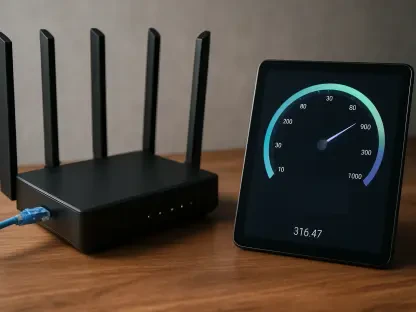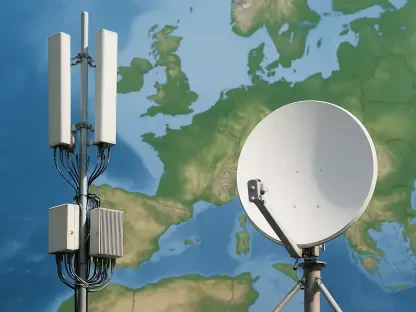T-Mobile US, Inc., a titan in the telecommunications arena, is embarking on a transformative journey to cement its dominance in 5G technology and enterprise innovation, guided by the strategic vision of its newly appointed President of Growth and Emerging Businesses, André Almeida, who assumed the role on September 1, 2025. With a proven history of driving growth at major telecom entities like Deutsche Telekom and NOS SGPS, Almeida is poised to steer T-Mobile toward capturing high-potential markets such as broadband, financial services, and enterprise solutions. His leadership comes at a pivotal moment as the company leverages advanced 5G standalone (SA) networks and Internet of Things (IoT) applications to redefine connectivity standards. This shift isn’t just about keeping pace with industry trends; it’s about setting the benchmark for what telecom can achieve in a digital-first world, particularly in enterprise and government sectors where demand for tailored solutions continues to surge.
Building the 5G Backbone for Tomorrow
T-Mobile’s commitment to 5G technology under Almeida’s direction goes far beyond mere infrastructure development, focusing instead on creating a robust platform for innovative applications. The company’s 5G SA network, renowned for its ultra-low latency and programmable capabilities, serves as a game-changer for industries seeking reliable, high-speed connectivity. This technology empowers advanced IoT solutions, enabling everything from real-time data processing in smart cities to precision automation in manufacturing. Almeida’s strategy emphasizes monetizing these capabilities, turning raw network power into tangible business value. By prioritizing enterprise markets over saturated consumer segments, T-Mobile aims to lead where growth potential is highest, positioning itself as an indispensable partner for industries navigating digital transformation.
The impact of T-Mobile’s 5G focus is already evident in its ability to support complex, data-intensive applications that competitors struggle to match. Unlike traditional networks, the 5G SA architecture offers customizable features that cater to specific industry needs, whether it’s ultra-reliable communication for healthcare or seamless integration for logistics. Almeida’s vision is to ensure that T-Mobile doesn’t just provide connectivity but acts as a catalyst for innovation, enabling businesses to rethink operational models. This approach not only strengthens T-Mobile’s market position but also sets a new standard for what telecom providers can offer in an era where digital solutions are paramount. The emphasis on 5G as a foundation for growth signals a clear intent to dominate emerging tech landscapes.
Fostering Enterprise Growth Through Collaboration
A cornerstone of Almeida’s strategy at T-Mobile lies in expanding the company’s enterprise presence through strategic partnerships and open innovation. Initiatives like the Telecommunications Network API Challenge, launched in collaboration with Deutsche Telekom, invite third-party developers to create cutting-edge solutions using T-Mobile’s 5G platform. This program exemplifies the company’s shift toward becoming a hub for digital transformation, with real-world applications already taking shape. For instance, Shabodi’s NetAware platform enhances factory safety by leveraging 5G capabilities, while Unmanned Technologies delivers remote healthcare solutions that bridge critical gaps. These examples underscore how T-Mobile is enabling industries to solve pressing challenges through tailored connectivity.
Beyond specific projects, T-Mobile’s broader goal under Almeida is to build an ecosystem where businesses and developers can thrive. By opening its network to external innovation, the company is fostering a collaborative environment that accelerates the adoption of 5G-driven solutions across sectors like healthcare, industrial automation, and urban planning. This approach contrasts with traditional telecom models that focus solely on infrastructure, instead prioritizing value creation through partnerships. Almeida’s leadership ensures that T-Mobile is not just a service provider but a key player in shaping how industries evolve in a connected world, with enterprise clients benefiting from customized tools that address unique operational demands.
Strategic Leadership for a Competitive Edge
Almeida’s appointment is part of a larger leadership restructuring at T-Mobile, designed to align top-tier expertise with the company’s ambitious objectives. Alongside him, John Saw’s promotion to President of Technology guarantees that network operations remain at the forefront of innovation, while Callie Field’s advisory role ensures a continued emphasis on customer satisfaction. This powerful combination of technological prowess, business acumen, and customer focus positions T-Mobile to outmaneuver competitors like Verizon and AT&T, who face significant financial constraints from their extensive 5G rollouts. Almeida’s track record of scaling operations across diverse markets adds a layer of strategic depth, ensuring that growth initiatives are executed with precision.
This leadership alignment reflects T-Mobile’s intent to balance innovation with operational excellence, a critical factor in a highly competitive telecom landscape. While rivals grapple with debt and slower adaptability, T-Mobile’s executive team is structured to prioritize agility and forward-thinking solutions. Almeida’s experience in turning around underperforming segments and driving revenue growth in previous roles complements the technical and customer-oriented strengths of his peers. Together, they form a cohesive unit capable of navigating industry challenges, from rapid technological shifts to evolving market demands, positioning T-Mobile as a formidable force in redefining telecom standards.
Navigating the Evolving Telecom Arena
T-Mobile’s strategic direction under Almeida mirrors a broader industry trend shifting from traditional infrastructure investments to value-driven services, particularly for enterprise clients. While competitors remain bogged down by the financial burdens of their 5G expansions, T-Mobile is carving a clearer path to profitability through diversified revenue streams. The focus on high-margin opportunities in enterprise markets, coupled with an ecosystem approach to innovation, sets the company apart in a crowded field. Almeida’s leadership is instrumental in steering T-Mobile through this dynamic environment, ensuring that it not only keeps pace with technological advancements but also anticipates the future needs of businesses and governments.
The competitive advantage lies in T-Mobile’s ability to pivot quickly and adapt to emerging trends, a flexibility that Almeida’s global experience enhances. By targeting enterprise solutions over consumer saturation, the company taps into less contested, high-growth areas where 5G can deliver outsized impact. This strategic clarity allows T-Mobile to build sustainable growth models, avoiding the pitfalls of over-leveraged infrastructure spending that plague others. As the telecom sector continues to evolve, T-Mobile’s proactive stance under Almeida’s guidance positions it to lead rather than follow, shaping the future of connectivity with a keen eye on practical, value-adding applications.
Unlocking Investment Opportunities in Telecom
From an investor’s perspective, T-Mobile stands out as a promising long-term play within the digital economy, bolstered by Almeida’s strategic oversight. With projections estimating the global 5G market to reach $1.2 trillion by 2030 and IoT revenue growth at a 20% compound annual rate, the company’s focus on these areas aligns with significant market potential. T-Mobile’s operational agility and emphasis on enterprise-driven innovation provide a solid foundation for capturing this growth. Investors seeking exposure to the next wave of telecom advancements may find T-Mobile’s blend of technological leadership and market positioning particularly compelling as a vehicle for substantial returns.
Moreover, the company’s ability to diversify revenue through 5G and IoT applications under Almeida’s direction mitigates risks associated with traditional telecom models. Unlike peers constrained by heavy debt loads, T-Mobile’s strategic roadmap prioritizes profitability through high-value sectors, enhancing its appeal as an investment. The leadership’s focus on execution ensures that growth initiatives translate into tangible financial outcomes, reinforcing confidence in the company’s trajectory. As digital transformation accelerates across industries, T-Mobile’s role as a key enabler of 5G solutions positions it at the forefront of investment opportunities in a rapidly evolving market.









